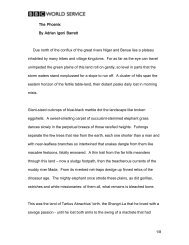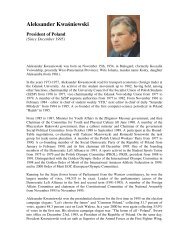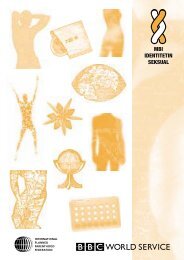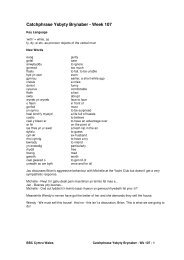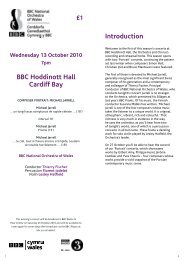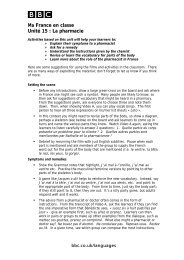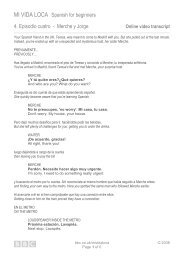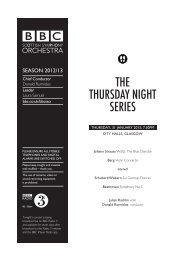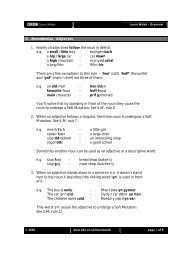PDF download On the trail of Orwell's outcasts - BBC
PDF download On the trail of Orwell's outcasts - BBC
PDF download On the trail of Orwell's outcasts - BBC
You also want an ePaper? Increase the reach of your titles
YUMPU automatically turns print PDFs into web optimized ePapers that Google loves.
<strong>On</strong> <strong>the</strong> <strong>trail</strong> <strong>of</strong><br />
Orwell’s<br />
<strong>outcasts</strong><br />
Emma Jane Kirby<br />
Image: Stephen Dowle
“Quarrels, and <strong>the</strong> desolate cries <strong>of</strong> street hawkers, and <strong>the</strong> shouts <strong>of</strong> children chasing-orange-peel over<br />
<strong>the</strong> cobbles, and at night loud singing and <strong>the</strong> sour reek <strong>of</strong> <strong>the</strong> refuse carts, made up <strong>the</strong> atmosphere <strong>of</strong> <strong>the</strong><br />
street… Poverty is what I’m writing about and I had my first contact with poverty in this slum.”<br />
P A R I S<br />
Such was George Orwell’s recollection <strong>of</strong> <strong>the</strong> Rue du Coq d’Or in Paris, 1929.<br />
Today it’s pleasure ra<strong>the</strong>r than poverty that defines <strong>the</strong> Latin Quarter that<br />
Orwell frequented 80-odd years ago. The chic pavement cafes are full <strong>of</strong><br />
contented-looking people leisurely sipping <strong>the</strong>ir vin rose, and <strong>the</strong> air is perfumed by<br />
<strong>the</strong> sweet-smell <strong>of</strong> crepes and tourists’ money.<br />
But poverty hasn’t left Paris – she’s simply changed address. She may not look<br />
quite <strong>the</strong> same as she did in <strong>the</strong> 1920s but if Orwell were to meet her again on <strong>the</strong>se<br />
streets, he’d know her straight away. And I doubt he’d find her greatly changed...<br />
Poverty came knocking on Claudine’s door five years ago when she was made<br />
redundant. She leans in close to me as she talks, her right hand <strong>of</strong>ten rising to her<br />
mouth as if it wants to censor <strong>the</strong> words that her lips keep forming. “Tomber dans la<br />
misere” (falling into misery), is <strong>the</strong> phrase she whispers most and I notice her breath<br />
is sour like someone who diets or skips meals.<br />
“We don’t eat lunch,” she tells me. “It’s just my little way <strong>of</strong> economising.” She nods<br />
down to her bulging shopping caddy. “It’s enough for my family’s dinner,” she says,<br />
“but not enough for two meals a day.”
Claudine and I are sitting in a big warehouse in <strong>the</strong> north <strong>of</strong> Paris, which serves as<br />
a food distribution centre for <strong>the</strong> city’s chronically poor. It reminds me <strong>of</strong> <strong>the</strong> sort<br />
<strong>of</strong> indoor market you find in <strong>the</strong> less salubrious quarters <strong>of</strong> former Soviet states –<br />
mountains <strong>of</strong> unbranded pasta and rice piled on tables, misshapen, anaemic-looking<br />
vegetables wilting in crates, biscuits and chocolate wrapped in such bland, stark<br />
white paper, that not even a child could be excited by its contents.<br />
We watch <strong>the</strong> steady line <strong>of</strong> people, Europeans, Maghrebians and West Africans,<br />
methodically trudging from table to table, collecting <strong>the</strong>ir rations and stuffing <strong>the</strong>m<br />
quickly into a pram hood or caddy. Despite <strong>the</strong> animated cheerfulness <strong>of</strong> <strong>the</strong> staff,<br />
I notice not one <strong>of</strong> <strong>the</strong> customers meets <strong>the</strong>ir eye as <strong>the</strong>y take <strong>the</strong> food parcels.<br />
Shame, Claudine – who is French – tells me, is what links everyone here. She’s told<br />
no-one that her weekly shop is a hand-out and she doubts anyone else here has<br />
admitted it ei<strong>the</strong>r.<br />
The secrecy that’s attached to poverty is one <strong>of</strong> <strong>the</strong> first things that struck Orwell.<br />
“From <strong>the</strong> start,” he wrote, “it tangles you in a net <strong>of</strong> lies and even with <strong>the</strong> lies you<br />
can hardly manage it.”<br />
Milly is fighting poverty with a fierce, indignant energy. A bilingual secretary from<br />
Cameroon, she is immaculately dressed and has <strong>the</strong> practised deportment <strong>of</strong> a<br />
society debutante.<br />
In <strong>the</strong> drop-in centre where I meet her, she looks decidedly out <strong>of</strong> place next to <strong>the</strong><br />
dusty, weary figures that are slumped beside her. Appearances, she tells me, are<br />
everything if one is to cling on to one’s dignity. She agrees to talk to me but only in a<br />
private room so that <strong>the</strong> o<strong>the</strong>r people here won’t realise that her situation is as bad as<br />
<strong>the</strong>irs. When <strong>the</strong> door closes she tells me that she’s homeless and last night she slept<br />
on a veranda.<br />
‘Tomber dans la<br />
misere’<br />
is <strong>the</strong> phrase she<br />
whispers most and I<br />
notice her breath is<br />
sour like someone<br />
who diets or skips<br />
meals”<br />
Emma Jane Kirby
Milly is facing deportation. She came here legally but after she fell ill and had to stop<br />
working, her carte de sejour – <strong>the</strong> papers that allow her to stay and work in France –<br />
were revoked. She admits that she is homesick but is terrified to return to Cameroon<br />
empty-handed. I ask her if her family know she’s homeless and she throws her hands<br />
up in <strong>the</strong> air and rolls her eyes in horror.<br />
“It would kill <strong>the</strong>m,” she tells me. “They would drop down dead with shame.”<br />
When I meet Modi from Mali, he looks as if he might drop down dead with fatigue.<br />
Like Orwell, Modi is a plongeur, a washer-upper in a big restaurant and he works six<br />
days a week, 12 hours a day cleaning pots and pans.<br />
When we talk in <strong>the</strong> bar <strong>of</strong> a neighbouring restaurant, his head keeps drooping onto<br />
his folded arms and it seems to be such an effort for him to articulate his words that<br />
he ei<strong>the</strong>r slurs <strong>the</strong>m all toge<strong>the</strong>r in a gluey, glottal jumble, or shoots out small phrases<br />
in tiny bursts <strong>of</strong> energy that fizzle out before <strong>the</strong> last word has been formed.<br />
Orwell complained that when working as a plongeur he felt as if his back were broken<br />
and his head “filled with hot cinders”. Modi agrees that he aches all over and at <strong>the</strong><br />
end <strong>of</strong> <strong>the</strong> day he cannot feel his feet.<br />
Because rent in Paris is too expensive, he lives an hour’s train ride outside <strong>the</strong> city.<br />
Although after midnight <strong>the</strong> trains are slower so it takes two hours for Modi to get<br />
home. He gets up at 0700 and gets to bed at 0200. Most plongeurs in Paris <strong>the</strong>se<br />
days are ei<strong>the</strong>r Pakistani or West African. I stop asking myself why that is, when Modi<br />
tells me how much he is paid – just under 4 euros (£3.50) an hour. He’s working, <strong>of</strong><br />
course, “on <strong>the</strong> black”.<br />
“The last time I had a night out,” he says flicking through a virtual diary in his brain,<br />
“was... last year.”
Madame Jolivet can have as many nights out with friends as she wants to – her<br />
problem is she’s not allowed to have any nights in with <strong>the</strong>m.<br />
The rules <strong>of</strong> her B&B state clearly that visitors are not permitted, but I have managed<br />
to frighten <strong>the</strong> landlady into admitting me by pretending to be an <strong>of</strong>ficial from <strong>the</strong><br />
local authority. Now I’m standing (albeit slightly stooped) in her fusty-smelling attic<br />
apartment.<br />
I am Madame Jolivet’s first visitor in six years and she is laughing hysterically at<br />
having won this tiny victory over her hated landlady. I tell her that in Orwell’s day,<br />
<strong>the</strong> residents in his filthy hotel used to yell “Vache! Salope!” (“Cow! Bitch!”) at <strong>the</strong>ir<br />
landlady, and Madame Jolivet doubles up with mirth as she mimes <strong>the</strong> insults at <strong>the</strong><br />
sky-light. Then, quite suddenly, she looks sick with fear and switches <strong>the</strong> TV on at a<br />
high volume, motioning to <strong>the</strong> door and telling me <strong>the</strong> landlady is probably listening at<br />
it. She’s right. We hear her tread s<strong>of</strong>tly back down <strong>the</strong> stairs.<br />
Orwell’s hotel room was infested with bugs – Madame Jolivet’s is infested with mice.<br />
She’s tormented by <strong>the</strong>ir scratching at night. She’s caught <strong>the</strong>m on camera during<br />
<strong>the</strong> day, and once she found one in her fridge. She complained to <strong>the</strong> landlady who<br />
warned her that if she mentions it again, she’ll kick her out – after all, she’s already<br />
been warned that her daughter’s voice is too loud.<br />
Madame Jolivet is a large lady and she squeezes herself round <strong>the</strong> tiny space <strong>of</strong> her<br />
apartment. When she’s at <strong>the</strong> sink she’s jammed between <strong>the</strong> bed and <strong>the</strong> table, her<br />
body painfully curved sideways to avoid smacking her head on <strong>the</strong> sloped ceiling.<br />
The landlady charges 1,730 euros (£1,500) a month for this space which she rents out<br />
as a 16 sq m apartment. Recently <strong>the</strong> police did a spot check on Madame Jolivet’s<br />
apartment and recorded <strong>the</strong> actual habitable surface area as just 5 sq m – that’s <strong>the</strong><br />
size <strong>of</strong> about six or seven beach towels.<br />
“[My family] would<br />
drop down dead with<br />
shame”<br />
Milly
Madame Jolivet lives here with her grown-up son and daughter. Until last year her<br />
o<strong>the</strong>r daughter lived with <strong>the</strong>m, too, but she tried to kill herself twice and is now in<br />
psychiatric care.<br />
Although it’s miles from <strong>the</strong> hostel where she’s staying tonight, Milly, <strong>the</strong> dignified<br />
lady from Cameroon <strong>of</strong>fers to come with me in <strong>the</strong> taxi to <strong>the</strong> Gare du Nord where I’m<br />
catching my train home to London to make my next step <strong>of</strong> Orwell’s journey.<br />
“In my country,” she smiles, “we never let a traveller start a journey alone.”<br />
She’s very jolly in <strong>the</strong> cab, reminiscing about her family, her sister in London, <strong>the</strong><br />
present she sent her nephew in America last year. By <strong>the</strong> time we get to <strong>the</strong><br />
Eurostar terminal I’ve completely forgotten that Milly’s homeless and I realise with<br />
a real physical shock that this is exactly what she wanted, that she wanted me to<br />
see her as she was before poverty possessed her – a very proper, very animated,<br />
valuable woman.<br />
She waves me <strong>of</strong>f, her whole body swaying into <strong>the</strong> gesture, in that exaggerated way<br />
that small children say goodbye. Each time I turn, she’s still <strong>the</strong>re, both arms in <strong>the</strong><br />
air, her head following <strong>the</strong> rhythm.<br />
Sitting in my seat on <strong>the</strong> train, my eyes closed, I can see her still. The last line from<br />
a Stevie Smith poem comes into my head:<br />
Not Waving but Drowning...
“There exists in our minds,” wrote Orwell, “a sort <strong>of</strong> ideal or typical tramp – a repulsive, ra<strong>the</strong>r dangerous<br />
creature, who would die ra<strong>the</strong>r than work or wash, and wants nothing but to beg, drink and rob hen-<br />
houses... I am not saying, <strong>of</strong> course, that most tramps are ideal characters; I am only saying that <strong>the</strong>y are<br />
ordinary human beings, and that if <strong>the</strong>y are worse than o<strong>the</strong>r people it is <strong>the</strong> result and not <strong>the</strong> cause <strong>of</strong><br />
<strong>the</strong>ir way <strong>of</strong> life.”<br />
L O N D O N<br />
Five minutes inside <strong>the</strong> soup-kitchen in Hackney, east London, and I<br />
immediately understand what Orwell meant – that <strong>the</strong> “typical tramp”<br />
does not exist.<br />
The “service-users” – as <strong>the</strong> volunteers here call <strong>the</strong>m – are a truly disparate group –<br />
some look as if <strong>the</strong>y’ve just stepped <strong>of</strong>f <strong>the</strong> tube after a busy day at work, o<strong>the</strong>rs are<br />
unkempt and smell feral. Some are evidently fighting a losing battle with drugs and<br />
alcohol, while o<strong>the</strong>rs look more in keeping with an old folks’ home.<br />
A well-spoken woman who is far more elegantly dressed than I am, and whom I take<br />
to be a doctor, confides in me her concerns about <strong>the</strong> well-being <strong>of</strong> a schizophrenic<br />
service-user she recently escorted to hospital. She <strong>the</strong>n confounds me by sitting<br />
down to eat <strong>the</strong> free meal. A man with a carefully oiled black quiff is introduced<br />
to me by a grinning volunteer as Shakin’ Stevens. I smile conspiratorially with him<br />
at Shaky’s delusions and am later told by <strong>the</strong> service manager that <strong>the</strong> volunteer,<br />
himself, is delusional and has been coming here to eat each week for years.<br />
What was it that Orwell said? “Change places and handy dandy, which is <strong>the</strong> justice,<br />
which is <strong>the</strong> thief?”
I am instantly struck by <strong>the</strong> civility <strong>of</strong> <strong>the</strong> meal time. A tattooed and very inebriated<br />
punk knocks over an elderly lady’s walking frame as he staggers to find a free seat.<br />
He apologises, asks if <strong>the</strong> seat beside her is taken and <strong>the</strong>n appears to engage her<br />
in polite conversation. When he is served a plate <strong>of</strong> Mediterranean vegetable pasta<br />
by <strong>the</strong> charming French chef, he thanks her pr<strong>of</strong>usely and leaning towards <strong>the</strong> Polish<br />
man opposite him asks if he would kindly pass <strong>the</strong> salt?<br />
As I pour tea and c<strong>of</strong>fee, an emaciated black man in a filthy sweatshirt shakes my<br />
hand warmly and asks me how I’m doing today? Society’s misfits, fitting in.<br />
It’s here I meet Stuart, who is currently on a methadone programme and who has<br />
serious mental health problems. Physically abused by his fa<strong>the</strong>r, Stuart was put<br />
into care in <strong>the</strong> North East <strong>of</strong> England, where he claims he was <strong>the</strong>n systematically<br />
sexually abused until he ga<strong>the</strong>red <strong>the</strong> courage to run away to London at <strong>the</strong> age<br />
<strong>of</strong> 15.<br />
Aside from a brief respite <strong>of</strong> a year or two when he had a council flat, <strong>the</strong> London<br />
streets have been <strong>the</strong> only home he’s known. He is now 40. I ask him to tell me what<br />
he remembers about those early years sleeping rough.<br />
He doesn’t miss a beat before replying, “Crack, heroin, begging, robbing, stealing<br />
and mugging”. An entire life, reduced into just six words.<br />
Grant on <strong>the</strong> o<strong>the</strong>r hand can talk <strong>the</strong> hind legs <strong>of</strong>f a donkey but he prefers to steer<br />
clear <strong>of</strong> personal details, claiming <strong>the</strong>re are many people worse <strong>of</strong>f than him.<br />
He zooms through his life story with a dismissive wave <strong>of</strong> his hand – adopted, never<br />
held down a relationship, used to work in social care, lost his job, lives in a hostel,<br />
spent a long time in hospital after being brutally attacked on <strong>the</strong> street.
He leaves out <strong>the</strong> part about his fairly evident problems with alcohol and when,<br />
three weeks into our acquaintance, I ask him about that side <strong>of</strong> his life he snarls<br />
defensively, “So that’s what you think is it? I’m just yet ano<strong>the</strong>r homeless drunk?”<br />
Grant is articulate and funny. He’s wary and prickly, yet sensitive and compassionate.<br />
He likes Orwell but prefers Jack London. When my questions become woolly, he pulls<br />
me up for being unfocused and he is constantly re-assessing and re-evaluating his<br />
own beliefs and opinions. Twice after our meetings he has sent me text messages,<br />
apologising for sounding grumpy. When we talk late in <strong>the</strong> evening, he suddenly<br />
checks his watch and becomes concerned about how I’m going to get home to <strong>the</strong><br />
o<strong>the</strong>r side <strong>of</strong> London. When I ask what keeps him going in life, he gestures towards<br />
<strong>the</strong> volunteers who are clearing up <strong>the</strong> kitchen.<br />
“Belief in your fellow man’s goodness,” he says. “Because by and large people are<br />
good, aren’t <strong>the</strong>y?”<br />
Orwell always defended tramps’ reputation as “drunks”, pointing out that none <strong>of</strong> <strong>the</strong><br />
tramps he knew had any money with which to buy beer. But today alcohol is cheap<br />
and features heavily in <strong>the</strong> lives <strong>of</strong> many <strong>of</strong> those on <strong>the</strong> streets. Not least in <strong>the</strong> lives<br />
<strong>of</strong> <strong>the</strong> many Poles who came to seek <strong>the</strong>ir fortunes as labourers in <strong>the</strong> UK when <strong>the</strong><br />
borders opened in 2004.<br />
When <strong>the</strong> recession bit and <strong>the</strong> building sites closed, <strong>the</strong>y had limited access to<br />
benefits and quickly found <strong>the</strong>mselves homeless. The volunteers in many <strong>of</strong> <strong>the</strong> dropin<br />
centres and soup kitchens I visit in London tell me that around a good third or even<br />
half <strong>of</strong> <strong>the</strong>ir service-users are now Polish. As one careworker put it, <strong>the</strong>y’re “Orwell’s<br />
latter-day Irish tramp” – Catholic, slightly on <strong>the</strong> fringe <strong>of</strong> <strong>the</strong> London homeless<br />
community, and plagued with a “great thirst”.<br />
“So that’s what you<br />
think is it? I’m just<br />
yet ano<strong>the</strong>r homeless<br />
drunk”<br />
Grant
Zibbi, who’s in his early 40s came to <strong>the</strong> UK seven years ago, where he got work in a<br />
salad factory in Peterborough. For nine months life was “good-good”, he tells me in<br />
his broken English.<br />
“Good-good, because Zibbi is good and Zibbi no drink.”<br />
Zibbi refers to himself almost entirely in <strong>the</strong> third person, as if while talking to me, he<br />
has stepped outside <strong>of</strong> himself and has become a detached observer, albeit with an<br />
anthropological curiosity in his own behaviour.<br />
“Do Zibbi drink today?” he asks me.<br />
By <strong>the</strong> look – and smell <strong>of</strong> Zibbi – he does little else but drink <strong>the</strong>se days. His face has<br />
bloated and taken on <strong>the</strong> colour <strong>of</strong> ripe plums, his hands shake and <strong>the</strong> sharp stench<br />
<strong>of</strong> pure alcohol from his breath overpowers even <strong>the</strong> acrid, vinegary smell <strong>of</strong> his<br />
clo<strong>the</strong>s and <strong>the</strong> odour <strong>of</strong> hot grease from his recent fried breakfast, which still hangs<br />
in fat little globules in his beard and moustache.<br />
He shakes his head. “Oh, lady,” he says, “Zibbi drink not a little drink, Zibbi drink and<br />
drink. He drink vodka til...” (he makes a gesture <strong>of</strong> passing out). “Until bang and bye<br />
bye. Game over.”<br />
Zibbi blames <strong>the</strong> heavy drinking culture <strong>of</strong> his country for his weakness and claims<br />
his cousin, Miro, is <strong>the</strong> worst influence on him, egging him on to have just one more.<br />
Frequently he seems to set himself on stage, <strong>the</strong>atrically acting out imagined dialogue<br />
he has with Miro and with his disgusted family. It’s like watching a medieval morality<br />
play, with <strong>the</strong> forces <strong>of</strong> Good and Evil battling for power.
The drop-in centre has set Zibbi up with an alcohol adviser who is trying to help him<br />
cut down his alcohol consumption. He talks about her in hallowed terms, and when<br />
he whispers her name “Karen”, he lifts his hands and face to heaven. I suspect she’s<br />
<strong>the</strong> only woman he has regular contact with. When I meet Karen later she tells me<br />
that she’s trying to wean Zibbi <strong>of</strong>f calling her “Mummy”.<br />
I ask Zibbi what he thinks <strong>of</strong> himself and he looks startled. “Me? Zibbi?” he asks<br />
uncertainly and his eyes become confused as if he’s struggling to connect <strong>the</strong><br />
alcoholic Zibbi character with <strong>the</strong> man who speaks his words.<br />
“I... I... I don’t know,” he stutters. He hangs his head and slumps in his chair.<br />
“So tired lady. I... I...”<br />
Zibbi becomes distressed as he fruitlessly searches for words which might join his<br />
isolated personal pronoun and we stop <strong>the</strong> interview. I realise he has totally lost his<br />
sense <strong>of</strong> self.<br />
A few miles east in Hackney, and Mikael, a young, good-looking Pole in his late 20s,<br />
has also lost his identity – or at least his identity papers. Someone stole <strong>the</strong>m one<br />
night a few months back when he’d blacked out in a vodka-induced stupor. Mikael is<br />
so s<strong>of</strong>tly spoken that he’s barely audible at times. He tells me that talking to me is like<br />
going to Confession.<br />
“I’ve thought about it [my situation] so many times on <strong>the</strong> streets,” he says.<br />
“Especially when I’m alone, but no-one really asked me before... I feel strengthless<br />
and hopeless.”<br />
Mikael underestimates himself. A bright man and a fluent English speaker, he’s
enrolled in an Alcoholics Anonymous programme and, in a bid to stay on track, has<br />
made <strong>the</strong> very difficult decision to eschew <strong>the</strong> company <strong>of</strong> his fellow Poles and all<br />
o<strong>the</strong>r rough sleepers. He is still on <strong>the</strong> streets but unlike Zibbi, he is wearing freshly<br />
laundered clo<strong>the</strong>s and looks fit and fairly healthy. He may not smell <strong>of</strong> alcohol but he<br />
reeks <strong>of</strong> loneliness.<br />
Seven years ago, life was very different for Mikael. He had a legal, well-paid job<br />
as a labourer, he had a fiancee, a studio-flat and a gym membership. There were<br />
holidays, cinema trips, football matches – <strong>the</strong>re was, as Mikael puts, it a time when<br />
he was “really connected to society∑ and <strong>the</strong>re was a future”. Then his boss sold his<br />
business and moved overseas. Mikael began drinking heavily, lost his studio and his<br />
girlfriend. I ask him what he misses most about his old life, fully expecting him to say<br />
<strong>the</strong> obvious things – a hot shower, a comfortable bed, his own food. But Mikael says<br />
something quite different.<br />
“I feel like I’m not needed by this world. Like nobody needs me,” he says quietly. “I<br />
miss my girlfriend because I felt <strong>the</strong>n someone needed me. And I felt needed in terms<br />
<strong>of</strong> work.”<br />
The evil <strong>of</strong> poverty, wrote Orwell, is not so much that it makes a man suffer as that it<br />
rots him physically and spiritually. Work, he insisted, is <strong>the</strong> only thing to turn a halfalive<br />
vagrant into a self-respecting human being.<br />
Mikael is desperate to find a job believing that work is <strong>the</strong> yellow brick road which will<br />
lead him “to come back to <strong>the</strong> normal life,” as he puts it. Although he admits that it’s<br />
hard to keep motivated when you wake up cold, wet and shattered from a disturbed<br />
night in a shop doorway.
Mikael’s progress is sporadic. He has long spells when he’s free <strong>of</strong> alcohol and <strong>the</strong>n<br />
sudden lapses which infuriate him and provoke tirades <strong>of</strong> self hatred, especially when<br />
he imagines what his family back home in Poland would say if <strong>the</strong>y knew he was on<br />
<strong>the</strong> streets.<br />
I return to <strong>the</strong> soup kitchen three weeks later confident <strong>of</strong> meeting Mikael again but<br />
worryingly, he doesn’t turn up. I think <strong>of</strong> <strong>the</strong> boyish shyness which passed across his<br />
face when he had told me that sometimes when he was very lonely he talked to God.<br />
The prayer he recited was always <strong>the</strong> same:<br />
“Hello God – I hope you still remember me and keep some faith in me.”<br />
At <strong>the</strong> end <strong>of</strong> Down and Out in Paris and London, George Orwell asks himself what<br />
he’s learnt from his experiences on <strong>the</strong> streets and in deference to <strong>the</strong> great man I<br />
shall ask myself <strong>the</strong> same question. I have learnt how quickly <strong>the</strong> dry rot <strong>of</strong> poverty<br />
stultifies and festers, crumbling confidence and destroying dignity.<br />
I have seen how poverty marginalises, separates and ridicules. And I have understood<br />
that <strong>the</strong> chief cruelty <strong>of</strong> homelessness is that it doesn’t dull <strong>the</strong> sensibilities <strong>of</strong> <strong>the</strong><br />
man sleeping in <strong>the</strong> doorway but ra<strong>the</strong>r spitefully heightens <strong>the</strong>m, forcing upon him<br />
so many cavernous hours in which he can burn with shame, ache with loneliness and<br />
cry for his mo<strong>the</strong>r.<br />
Perhaps Mikael sums it up for everyone I have met both in Paris and London when he<br />
says, “You know it’s so easy to lose everything. But it’s so, so tough to get it back.”<br />
<strong>BBC</strong> © 2011




